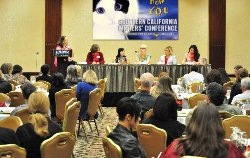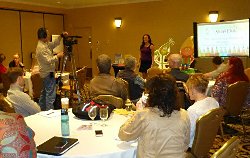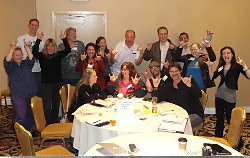A personal message from MICHAEL STEVEN GREGORY, SCWC Executive Director
 THE SCWC HAS GROWN a lot since its founding in 1986, expanding to sometimes three events a year and enlisting a constantly growing roster of accomplished authors, agents, editors and publishers to address the needs of emerging writers intent on getting into print. Some of our success can be measured in dollars, with some $4 million in book and screen deals facilitated through the efforts of our presenters.
THE SCWC HAS GROWN a lot since its founding in 1986, expanding to sometimes three events a year and enlisting a constantly growing roster of accomplished authors, agents, editors and publishers to address the needs of emerging writers intent on getting into print. Some of our success can be measured in dollars, with some $4 million in book and screen deals facilitated through the efforts of our presenters.
As with the publishing industry as a whole, there’ve been many changes in the writers’ conference business over the past decade. With more events than ever sprouting up, the need to ascertain the benefits of each becomes more important in deciding which merit your investment of time and money to attend. Each, after all, is different.
For instance, many conferences now offer “speed dating” sessions with editors & agents where conferees pay extra for the opportunity to pitch the breadth of their book or screenplay to someone who can supposedly make a qualified assessment of its commercial viability in, say, five minutes or less without reading a single word of the writer’s prose, let alone approach, style or authorial voice. While no doubt there are exceptions, albeit rare, I believe the practice is often a mercenary sham geared to bilk the writer.
The emerging writer needs attention. The emerging writer’s work deserves substantive, thoughtful attention. And the likelihood of getting such attention in five minutes or less is slim. The SCWC has not and will not conduct such a practice.
 These days it seems too many conferences are no longer interested in the writer, that is, the conferee investing her cash and dreams into the legitimate expectation that industry professionals will afford quality time to address her needs with regard to the work. Money, as usual, is the priority – dangle a “meet the agents or editors” carrot, pack as many aspiring writers as you can into the room, yack a few encouraging platitudes at ’em, then cut ’em loose. Good luck with your career! As a result, they’ve blown their shot to make a lasting, positive impression with an agent or editor to follow up with later.
These days it seems too many conferences are no longer interested in the writer, that is, the conferee investing her cash and dreams into the legitimate expectation that industry professionals will afford quality time to address her needs with regard to the work. Money, as usual, is the priority – dangle a “meet the agents or editors” carrot, pack as many aspiring writers as you can into the room, yack a few encouraging platitudes at ’em, then cut ’em loose. Good luck with your career! As a result, they’ve blown their shot to make a lasting, positive impression with an agent or editor to follow up with later.
Time and again what we hear from writers at the SCWC is that they attended the wrong conference first. Eager to meet an agent or editor and show their work, after having struggled for so long just to finish it, they’ve signed on for these wind tunnel speed bouts with the expectation of being discovered, only to discover for themselves that their work still needs more work.
Where to go next?
How to fix a manuscript, troubleshoot problematic aspects and polish it in order to successfully communicate the author’s intent, thus bolster the prospect of its being recognized as a professional-quality manuscript worthy of commercial consideration, is the top challenge that most writers working in isolation face. It is also the top lament so many have shared with us over the years, who’ve selected a conference they were led to believe would empower them, but served only to dispirit them with rejection and little else to go on.
 Without insightful, constructive feedback from professionals, many writers don’t know what’s working in their material, what’s not working, or even how to fix it if they do. Getting germane feedback on issues of voice, character construction, point of view, overall structure and execution requires more than five minutes of face-time.
Without insightful, constructive feedback from professionals, many writers don’t know what’s working in their material, what’s not working, or even how to fix it if they do. Getting germane feedback on issues of voice, character construction, point of view, overall structure and execution requires more than five minutes of face-time.
Agents often respond to the commercial viability of the idea behind material. Few are prepared to address issues of execution, let alone explore the intricacies of possible solutions. Consequently, more than anything else what many writers require is the insight and guidance of accomplished authors who know the craft, the tricks, the secrets and the business of getting published. And who are willing to tap into the vital industry contacts they’ve nurtured over their careers in order to help you, if warranted.
That’s where we come in. The SCWC is personal. Among the things I’m most proud of in my life are the writers that have come to the SCWC and persevered to get their work where they want it to be. Not every writer aspires to be on the New York Times Bestsellers list. For many, just finishing the book they’ve written and seeing it in print is the one thing they ever wanted. But the writing community is a community of many ones — the one right person who believes in your potential and is in a position to ensure you fulfill it will make a difference. Such commitment extends beyond a weekend.
One of the keys to the SCWC’s continued success is the read & critique and interactive troubleshooting workshops. Conducted by real-world professionals devoted to providing comprehensive feedback on YOUR work, established authors address the issues many of us never thought of, or had no one to turn to for, when first starting out.
 If there’s any doubt whatsoever that your manuscript is not as polished as it must be for commercial consideration, then getting empirically qualified feedback on it should be a priority, and certainly among your top expectations from a writers’ conference.
If there’s any doubt whatsoever that your manuscript is not as polished as it must be for commercial consideration, then getting empirically qualified feedback on it should be a priority, and certainly among your top expectations from a writers’ conference.
Over four-dozen sessions addressing fiction, nonfiction, business and marketing, extensive read & critique workshops, one-on-one consultations, special guest speakers and more are what’s in store for those attending any given SCWC, which tends to run late into the night and early morning hours each day in effort to provide just that.
If you, the emerging writer, are weighing which conference to attend at this stage in your journey, I encourage you to look closely at the schedules of other conferences, determine how much time is being devoted to your immediate needs, and choose wisely. While many now incorporate aspects of our structure into their own none are the SCWC, which may explain why so many conferees return year after year, regardless of their success.
Settle for exceptional and nothing less.
Community. Quality. Encouragement. Respect. You’ve earned it.
At the SCWC, you’ll get it.
